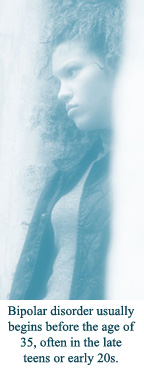 Bipolar
Disorder
Bipolar
Disorder
Bipolar disorder is a mood disorder and should be diagnosed by a professional. It used to be called manic-depressive illness. With bipolar disorder, there are feelings of terrible “lows” and there may also be periods of extreme “highs.” With these “highs,” a person feels happy, giddy, elated or euphoric (mania). These cycles of “highs” and “lows” can last from several days to several months. In between these cycles, a person with bipolar disorder can feel completely normal. Sometimes they have repeated episodes of depression and only a few “manic” episodes. Or the opposite may be true. They may have many manic episodes and few depressive ones.
Major depression can occur at any age. About 1 in 100 people have bipolar disorder sometime in their life. It affects men and women about the same.
Bipolar disorder runs in families. Close relatives of people who have this illness are 10 to 20 times more likely to develop either depression or bipolar disorder than the general population.
Research suggests that imbalances in chemicals by which the brain cells communicate could be a factor in bipolar disorder. Some studies hint that stress and such things as difficult family relationships may aggravate this condition.
How to Recognize Bipolar Disorder
Symptoms of the Manic Phase
|
|
Euphoria. The person feels “on top of the world.” Nothing, not even a tragedy, changes these extreme feelings of happiness. These feelings are out of proportion to an event or come with no apparent reason. They can last a long time. |
|
|
Hyperactivity. The person can do a great number of things and show little need for sleep. |
|
|
Flight of ideas. The person’s thoughts race from one thing to another. When they talk, words come out in a non-stop rush of ideas that quickly change from topic to topic. They may be hard to understand. |
|
|
Loss of restraint and lack of judgment. The person may take part in high risk activities, such as reckless driving or even jumping off a building because they don’t think they’ll be harmed. The person may also go on spending sprees or make foolish decisions about money. |
|
|
Paranoia, delusions, and/or hallucinations in some people. |
Symptoms of the Depressive Phase
|
|
Suicide attempts. Thoughts of death or suicide. |
|
|
Feelings of prolonged sadness, hopelessness, helplessness, total indifference |
|
|
Inability to concentrate or remember things |
|
|
Crying spells |
|
|
Withdrawal from activities the person used to enjoy |
|
|
Jumpiness or irritability |
Treatment
Nearly everyone who suffers from bipolar disorder, even those with the most severe cases, can be treated successfully with professional assistance. This condition should not be treated solely by oneself. Several treatments are available.
|
|
Medications - Drugs,
such as lithium are very effective in controlling the manic episodes
and lessen the severity of the depressive episodes. They act to
prevent the recurrence of both manic and depressive episodes. |
|
|
Hospitalization - This
may be needed when mania or depression are out of control or keep
the person from functioning. |
|
|
Electroconvulsive therapy (ECT)
- Electric shocks to the brain are sometimes used in treating very
severe depressive episodes that do not respond to medication. |
|
|
Therapy - Professional counseling is useful with medication in treating this disorder. It can give support to the patient and their family, as well as, educate them about the illness. Therapy can be in many forms - individual psychotherapy, behavioral therapy, and support or group therapy. |
Left untreated, bipolar disorder can result in:
|
|
Ruined personal and social relationships |
|
|
Loss of employment, flunking out of school, disability, and/or legal problems |
|
|
Increased paranoia and hallucinations |
|
|
Suicide |
What You Can Do for a Friend or Relative
|
 |